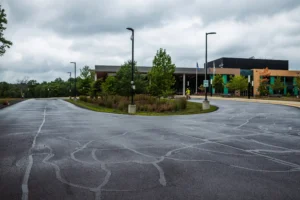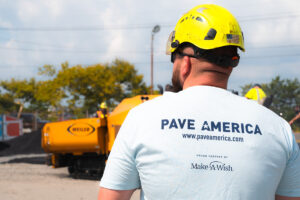
Concrete Paving Overview
Concrete has long been a popular surface covering for paving installations of all kinds, from major highways to residential driveways and everything in between. With over 20 billion tons of concrete being put to use every year, it’s safe to say that this classic building material has an enduring fan base! There are many reasons for concrete’s popularity: it’s exceptionally strong, durable, versatile, and for driveway installations in particular, it is a surface covering that offers aesthetic appeal along with excellent functional value.
Well-installed concrete will not only beautify the exterior of your home or business, but it will also provide you with decades of service life with little to no maintenance required.
What is Concrete Made Of?

Before we go any further, it would be useful to find out what makes this extremely popular material so strong and durable.
Concrete is comprised of three basic “ingredients”: Water, aggregate (often gravel, crushed rocks, or sand) and Portland cement.
Now right away, some people might assume that the words “cement” and “concrete” are interchangeable, but that would be like saying that flour and cake are the same thing.
Cement is actually a powdery substance that acts as a binding agent in the concrete mix.
As soon as cement is combined with the water and aggregate particles, the entire mixture transforms into a semi-solid “slush” that can be poured and manipulated to fill practically any form or shape you desire.
Once this mixture is poured, it will eventually harden into the material that we all know as concrete.

What’s interesting is that not only is hardened concrete one of the strongest materials on earth, but as the years go by, it continues to get stronger and harder over time.
One excellent example is the colossal Hoover Dam – even though it was built more than 80 years ago, the concrete in this massive structure is still curing to this day!
The Unbeatable Strength of Concrete
Strength is one of the most prominent reasons why people choose concrete as a paving material for their Austin paving project.
This robust material reaches an average compression strength of around 2,500 to 5,000 psi (pounds per square inch) but there are even some mixes that have a compression strength of up to 20,000 psi. For the most routine uses (e.g. a driveway), a compression strength of 2,500 to 4,500 psi is typically used which is suitable for bearing the load stresses of most vehicles.
Your paving contractor will be able to tell you whether or not you will need a higher strength rating based on the type of loads that your pavement is intended to bear.

For example, if you’re going to keep an RV or some other large, heavy vehicle parked on the driveway, more than likely your paving contractor will recommend a stronger grade of concrete or to increase the thickness of the slab.
The typical thickness for a driveway slab is usually about 4 inches, but if the expected load capacity calls for it, your paving contractor may increase this thickness by an inch or two based on their discretion.
In fact, increasing the thickness of a pavement slab by just one inch can increase its load-bearing capability by up to 50 percent!
Believe it or not, sometimes the biggest load stresses do not come from what’s on top of the slab but from what’s beneath it. Issues such as heaving (swelling due to the expansion of soil) from the subgrade can place incredible stresses on concrete slabs from beneath the surface.
This is why it’s so important to make sure that you only choose a qualified and experienced paving contractor to install your driveway as it will be facing significant issues from both above and below.

Benefits of Concrete Driveways
1. Affordability
Concrete lands somewhere in the middle of the scale in terms of cost – it’s not the cheapest way to go, but it’s also not the most expensive either.
While costs can vary based on a number of factors (including region), the general price range for a basic driveway installation will be somewhere between $4 to $10 per square foot.
As we have mentioned before, there are a number of variables involved in pricing a pavement installation but for the most part, the price range above represents a large percentage of concrete paving jobs in terms of the all-in cost to get it installed.
Not only is this a reasonable and competitive up-front cost, but since concrete is a virtually maintenance-free surface covering, the long-term savings you can realize from choosing this paving material for your project can be quite substantial.

2. Long Lifespan
When properly installed and maintained, an average concrete driveway can last anywhere from 25 to 30 years or even longer.
The reason why there’s such a large variation in its expected age is because there are several important factors that contribute to the quality and durability of the pavement slab.
Variables such as subgrade quality, frequency and type of maintenance performed, drainage considerations, and weather/climate issues can all play a part in the long-term performance of your surface covering.
We hate to sound like a broken record here, but the quality of the actual installation is going to be one of the biggest factors that determine the lifespan of your driveway.
By getting your concrete driveway sealed every 5 years and by choosing a skilled paving contractor who pays close attention to detail and offers quality workmanship, your pavement stands a much better chance of remaining strong, resilient, and durable over the long haul!
3. Quality Appearance

Concrete can provide plenty of “curb appeal” because it offers a neat, clean, and professional look that will complement your business or home’s exterior.
Keep in mind that your driveway is one of the first things people will notice when they pull up to your home, and it’s a fantastic way to increase the value of your property.
First impressions do count, and well-installed concrete can provide a memorable one by adding more aesthetic appeal to your home.
4. Strength and Durability
As mentioned earlier, concrete is one of the strongest and most durable building materials on the planet.
The fact that there are concrete structures from the days of antiquity that are still standing today – many of which are still fully functional – is a testament to the unparalleled strength and durability of concrete.
For example, the Pantheon in Rome is a massive structure that was built in 126 A.D. and yet it still remains the world’s largest unsupported concrete dome, comprised of more than 4,500 metric tons of Roman concrete!

Although nowhere near as grandiose as an ancient Roman temple, a driveway constructed of concrete can also provide decades of service life due to the outstanding durability of this highly popular building material.
5. Versatility
Regardless of what type of exterior decor or landscaping you have installed around your property, concrete can complement a wide range of tastes and styles.
Not only that, but with options such as stained or stamped concrete , your paving contractor can replicate virtually any type of texture, pattern, or color you desire.
With their expert advice, RDC Paving is sure you will find a style of pavement that can match and enhance the look of your property.



